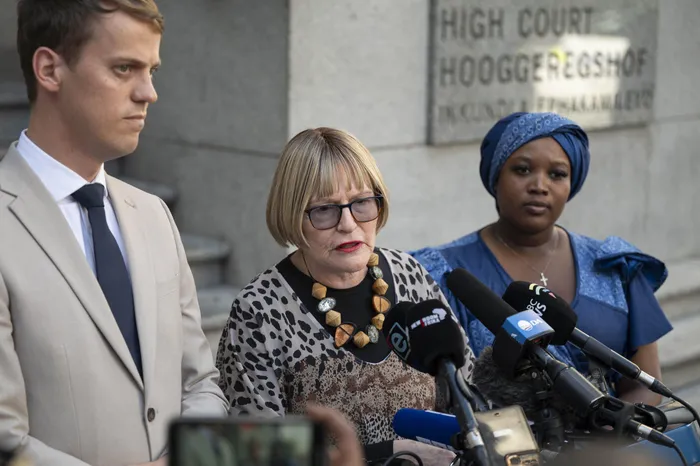
Democratic Alliance (DA) Federal Council chairperson Helen Zille outside the Western Cape High Court. The party filed an urgent application to interdict the implementation of the 0.5% value-added tax (VAT) increase.
Image: Armand Hough / Independent Newspapers
THE DA has side-stepped questions relating to the involvement of its MP, Ashor Sarupen, as the deputy finance minister in the drafting of the original Budget Speech containing a 2 percentage point VAT increase, which was subsequently turned down by majority parties forming the Government of National Unity (GNU).
The party is on Tuesday expected to present its case before the Western Cape High Court, where it wants to have the parliamentary decision endorsing a 0.5% VAT increase over two years declared invalid and suspend its implementation on May 1, pending a constitutional challenge in part B of its application.
The party had failed to stop its GNU partners, the ANC, from forging ahead with a VAT increase, after ActionSA, led by former DA mayor Herman Mashaba, came to the rescue and gave the fiscal framework the green light.
ActionSA has since called out the DA over Sarupen’s "intimate involvement” in the budget process, particularly in drafting the original budget.
“The DA has cynically weaponised this very VAT hike in a desperate attempt to salvage its political image and to extract more influence in the GNU. Their kamikaze-style attacks on the budget process were never about blocking an unjust tax hike— they were a deliberate attempt to sabotage the budget entirely and hold the country’s finances hostage, all in the hope of renegotiating their increasingly fragile position in the GNU. They failed. In that failure, the DA’s effort to secure unrelated concessions to strengthen their grip over the Western Cape became plain to see,” said ActionSA MP, Alan Beesley.
In response to ActionSA, the DA said: “The DA has opposed the outrageous VAT increase from the start and will continue to do so, both in Parliament and in court.”
In its court papers, the DA argues: “It is not about whether the VAT increase is good or bad. That is not an issue for this Court to decide. It is for our elected representatives in Parliament to decide. The problem is that s 7(4) allows the Minister to usurp that power, and Parliament has failed to abide by its own legislation when deciding whether to endorse the VAT increase. All the DA seeks is relief to ensure that decisions constitutionally assigned to Parliament are taken by Parliament, and that Parliament acts lawfully when it considers those questions. The impact of suspending the VAT hike is, in any event, uncertain.”
The EFF who have joined the application said they would be at court Tuesday to halt the implementation of the VAT over what they view as an "unprocedural adoption" thereof.
“This fiscal framework which contains the VAT hike proposal is a betrayal and burden on the poor which should have been stopped and could have been stopped if political parties did not allow themselves to be used by the ANC to pass a budget with VAT hikes while making non-binding recommendations to reverse what they supported within 30 days. The EFF’s court challenge is an important avenue to rescue ordinary South Africans from the VAT hikes and the bracket creep which will see those who are employed pay more as a result of lending in a higher tax bracket because tax brackets have not been adjusted in accordance to inflation,” said EFF Treasurer General Omphile Maotwe.
In his court papers, Finance minister Enoch Godongwana maintained that the fiscal framework was not legislation.
“Nor does it impose taxes. It is a parliamentary resolution that sets out revenue proposals, expenditure estimates, and related fiscal targets over the medium term. After it is adopted, the resolution's purpose is to govern proposed amendments to relevant money bills (section 8(9) of the Money Bills Act)."
He said the National Treasury has estimated that the 2025/26 budget was based on the assumption that the 0.5 percentage point VAT increase would generate about R13.5 billion in additional revenue this financial year.
“If the rate increase is halted now, that revenue will be lost, and the State will be left without the funds needed to meet already-budgeted spending commitments. The consequences would be severe and far-reaching. The government would be immediately forced either to cut expenditure or to increase borrowing. Both options carry risks. Spending cuts would likely fall on essential education, healthcare, housing, and social protection programmes. These disproportionately affect the poor and vulnerable,” said Godongwana.
Cape Times